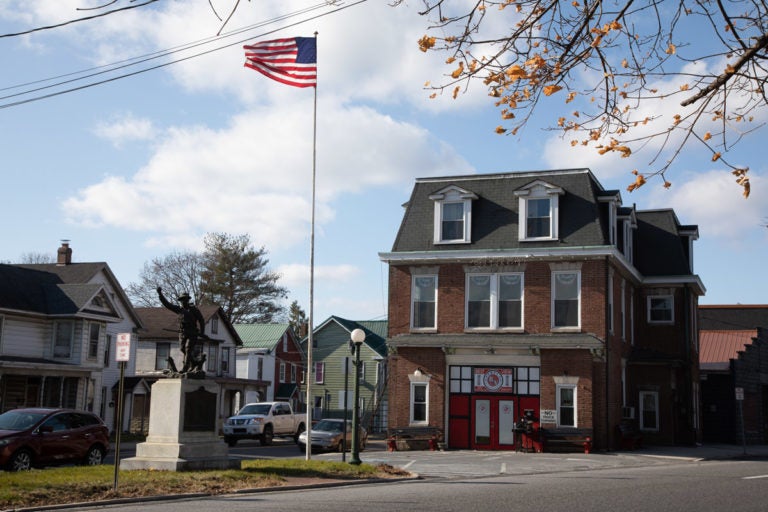Pa. counties push to reopen with little power to protect businesses ‘caught in the middle’
Despite their frustrations with COVID-19 restrictions, counties in Pennsylvania don’t have much authority to declare themselves open or closed.

Scenes from Chambersburg and Franklin County, December 2019. (Jeffrey Stockbridge for Keystone Crossroads)
Ever since several Pennsylvania counties announced they planned to begin allowing businesses to reopen in violation of Gov. Tom Wolf’s COVID-19 mitigation order, Gene Barr, who heads the state’s Chamber of Business and Industry, has seen a distinct uptick in confused calls.
“It’s a really, really difficult position,” Barr said. “It puts businesses square in the middle of having to make a very, very difficult choice in terms of surviving, or facing some kind of reaction from authorities.”
Barr said he now has his advice for business owners and local chambers of commerce down pat. Even if they’re based in one of several counties that have declared plans to begin reopening, he tells them they have to operate at their own risk.
If they have state licenses — particularly, valuable liquor licenses which can cost hundreds of thousands of dollars — Barr tells owners they should weigh the possibility of losing them. And they should check with their insurers to see what will happen if they disobey state law.
That’s because no matter how frustrated county officials are with Wolf’s slow reopening process, they don’t have much real authority to declare themselves open or closed.
The wave of discontent crested early this week, with a handful of counties outside the hard-hit Southeast expressing firm intentions to reopen. But after Wolf announced he would use his power over licensing and cash disbursal to enforce closure orders, the effort flagged. A few days later, several counties have walked back their reopening plans. And in those that haven’t, it’s not actually clear what the “reopening” will change.
That’s even the case in Lancaster County, which has been one of the most steadfast in its officials’ commitment to starting the reopening process.
Lancaster has an advantage over some smaller counties, because its size means it already received federal CARES Act funding directly, to the tune of nearly $100 million. Like most of the counties that are moving to reopen, the plan Lancaster officials put together calls for a move into Wolf’s “yellow” phase on May 15 with some restrictions lifted.
County commissioners want to use their CARES Act money for a few concrete initiatives: a small business recovery plan, an effort to test nursing home residents and staff, and a contact tracing collaboration with Penn Medicine Lancaster General Health.
But asked what authority the county has to begin reopening independently, the two GOP commissioners backing the effort — Joshua Parsons and Ray D’Agostino — acknowledged that they haven’t voted on any specific proposals, and that business owners will need to open with the understanding that the county can’t protect them from state retaliation.
D’Agostino said he’s hoping to correct what he sees as “chaos” caused by the Wolf administration’s unpredictable pattern of granting — and in some cases, subsequently revoking — business operation waivers.
“They don’t know where they stand,” he said. “All this has led to several law enforcement and district attorneys to announce they cannot enforce all these business closure orders, as the rule of law depends on fair and equal treatment.”
Meanwhile, Craig Lehman, the board’s sole Democrat, spent Thursday’s contentious county press conference registering disapproval of his fellow commissioners’ plan — calling the May 15 opening an attempt at “playing politics” based on a “half-truth.”
“The question becomes, are we ready to move to yellow tomorrow? The answer is no,” he said. “Yes, our hospital has capacity … but as of yesterday, we were still averaging 48 cases per day, and the contact tracing capacity we have, when it is up and running — which it won’t be until at least May 22 — is 50.”
Perhaps no county better exemplifies the tension over business closures, however, than Franklin — which makes Lancaster’s situation look relatively harmonious in comparison.
Though Franklin was one of the counties that unequivocally told the state it would be moving out of the “red” phase — the most restrictive category in Wolf’s reopening plan — only one of its three county commissioners was on board. The bulk of the support came from Republican state representatives and senators who hold seats in the county.
David Keller, one of the commissioners who didn’t sign the reopening letter, said he first saw it last Saturday, when state Sen. Doug Mastriano (R-Franklin) circulated a draft he’d written.
After an editing process that saw Mastriano’s draft softened a bit, Keller decided he still couldn’t support it, and quietly contacted Wolf administration officials to tell them he didn’t intend to reopen anything without permission.
“We’re in a public health crisis,” he said. “This has been a very fluid situation, and I think … it’s appropriate for the governor of the state to exercise authority in the way that Gov. Wolf and other governors are operating.”
Keller desperately wants to reopen some businesses. He said while he doesn’t think Franklin County is ready to open daycare facilities, one of the key changes Wolf’s “yellow” phase would bring, he’d like to ease into a middle ground, where more businesses can operate with social distancing and conduct curbside pickups.
But he has no faith that the county can do that effectively without support from the state. Part of the reason he’s bucking his fellow Republicans so publicly is that he’s worried their reopening declaration could give businesses a false sense of security, and get them into trouble with the state.
Like Barr at the Chamber of Business and Industry, Keller has been fielding a lot of calls from business owners who want to know what they should do.
“I’ve told anyone who’s asked that opening your doors and acting as if the county is in the ‘yellow’ phase, if your business is not eligible to do that, you need to be aware that there are potential legal and financial liabilities that go along with that,” he said.
He and Robert Ziobrowski, the other Franklin County Commissioner opposed to an independent reopening, released a letter Wednesday telling residents the majority of county leadership intends to stay in the “red” phase of the governor’s plan.
“While we may not agree with every decision made at the state level, we do not encourage defiance by residents or businesses,” they wrote.
The politicians who initiated Franklin’s bid to reopen see the situation a little differently. Mastriano, the original author of the plan, said it could be accurately called a declaration of independence from what he views as a “constitutional crisis.”
But, he acknowledged, it’s a declaration that does not, per se, carry legal weight.
“We’re reasserting our constitutional power, and our rights,” he said. “You have to go back to our founding document of life, liberty and the pursuit of happiness.”
State Rep. Paul Schemel (R-Franklin), one of the lawmakers who helped edit Mastriano’s declaration, is on a similar page. He said it’s a statement of values.
“We want the governor to look at our county, Franklin County, and say look, the criteria there have been met,” he said. “We have flattened the growth curve, the incidence of our COVID positives are in more isolated parts of our population.”
Chris Borick, a pollster and political science professor at Muhlenberg College, said he has spent the past week watching this growing tension between the state and counties with fascination. Counties, he noted, are at a real disadvantage when it comes to taking on the governor directly.
“It sounds really weird, I always baffle my students on this — [local governments] don’t have a constitutional right to exist. It’s the states that enable them,” Borick said. “They’re nothing but creatures of the state.”
But he added, political realities add yet another wrinkle to the situation. Even though the governor may have the power to enforce his orders, that doesn’t mean he’ll always use that power to its full extent.
“That’s what the battle is,” Borick said. “You have the legal justification, but what’s your enforcement? And that’s what some of these folks are calling — ‘Well, OK, come shut me down.’”
Wolf, he concluded, is likely weighing his options. Deploy state police to shut businesses down? “Not optimal.” But take subtler measures, like revoking licenses?
“I think you’re going to see a lot more of that moving forward,” Borick said.
WHYY is your source for fact-based, in-depth journalism and information. As a nonprofit organization, we rely on financial support from readers like you. Please give today.





![CoronavirusPandemic_1024x512[1]](https://whyy.org/wp-content/uploads/2020/03/CoronavirusPandemic_1024x5121-300x150.jpg)


